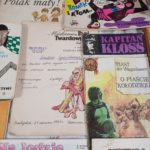
Polacy na wschodniej Ukrainie w latach 1832-1921
2025-06-03
Otwarcie przepięknej wystawy „Dom mojego dzieciństwa” w Muzeum w Drozdowie
2025-06-05Aurel Stoica & Marta Moldovan-Cywińska: Let's talk about Eliade and laughter

Aurel Stoica: I went back to reading Mircea Eliade again.
Marta Moldovan-Cywinska: We think in parallel, because I do too.
AS: And we share a fascination with Romanian philosophy.
MMC: And not only ...
AS: Let us remind our readers: “Profanum” in the elementary sense is the opposite of sacrum, or the secular sphere. as opposed to the sacred sphere.
MMC: And the Latin term for forms of secularity is precisely “profanum,” coming from “pro” (“before”) and “fanum” (“temple”), meaning that which is human and not related to the religious or sacred sphere.
AS: And since play is a source of cognition for us....
MMC: Already Bakhtin said laughter is a degrading element emphasizing its connection with freedom.
I'm more fascinated by the analysis of laughter as an expression of the profane, the escape of illusion, fun as an example of an illusory world....
AS: ... based on order and prosperity....
MMC: ... on the space of material and immaterial play. Many contemporary phenomena have the characteristics of unconscious play. Following Bakhtin: a form of empirical destruction in a given time and place.
AS: You are teasing me by referring to Bakhtin, because I know you disagree with him on many issues.
MMC: ...but his golden thought: “relativism means withdrawing from the fun” amused me to tears.
AS: Bakhtin or Huizinga?
MMC: Definitely Huizinga, and to that the perception of certain people's behavior as participation in comedy, according to Kenneth Burke's theorizing (On symbols ans society, ed. J.R. Gusfield Chicago Press (1989). And two types of thinking: “fearless thinking” and ”fear-inducing thinking.”
AS: But let's go back to Eliade.... .
MMC: The manifestation of the sacred (hierophany) organizes our everyday life, determines the “center” and directs space. Time, too, has a hierophanic origin, which survives to this day in rituals associated with the seasons, for example. “Religious man” lives in a hallowed world. According to Eliade, people have been religious in this sense since time immemorial and remain so - often unconsciously - to this day.His vision would be corroborated by recent archaeological research, which uncovers forms of religious life in the increasingly distant past.
AS: Hermetic conversation is also a form of play.
MMC: And a game at the same time. On its own terms.
AS: Thank you very much for the interview.
MMC: Thank you.
https://www.youtube.com/shorts/mh8yFSOav2s
Fot. Pixabay




